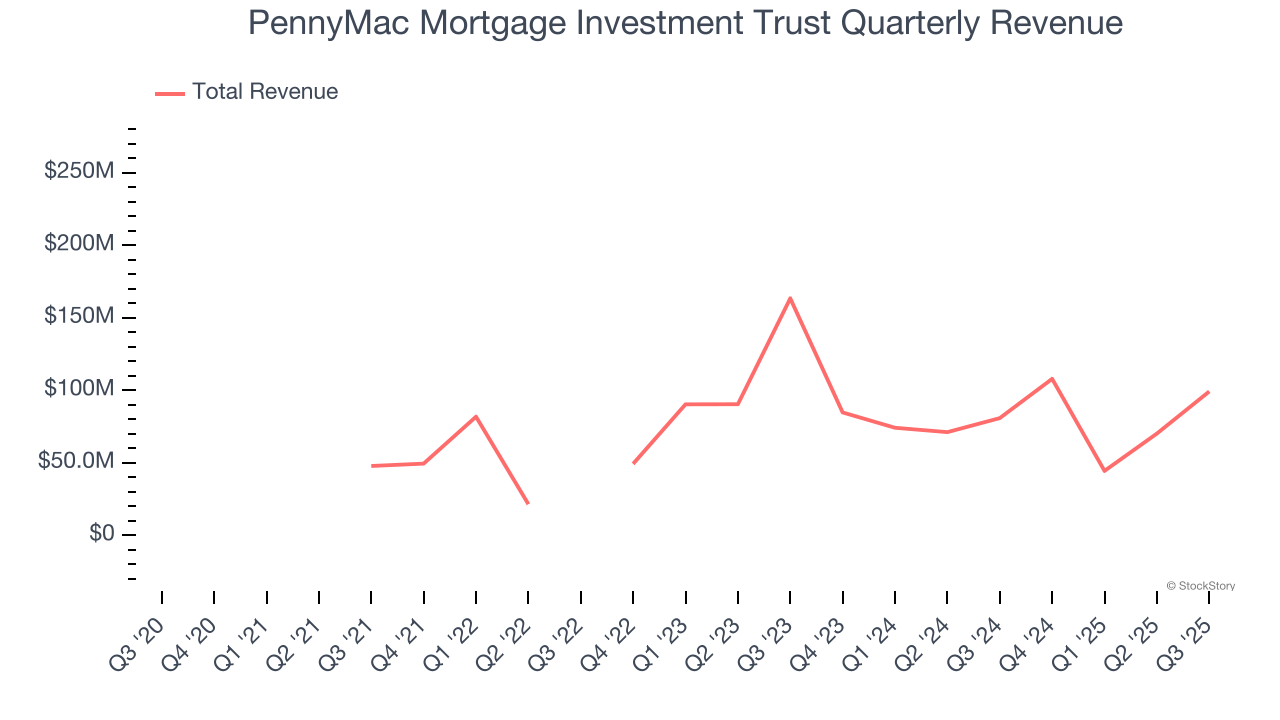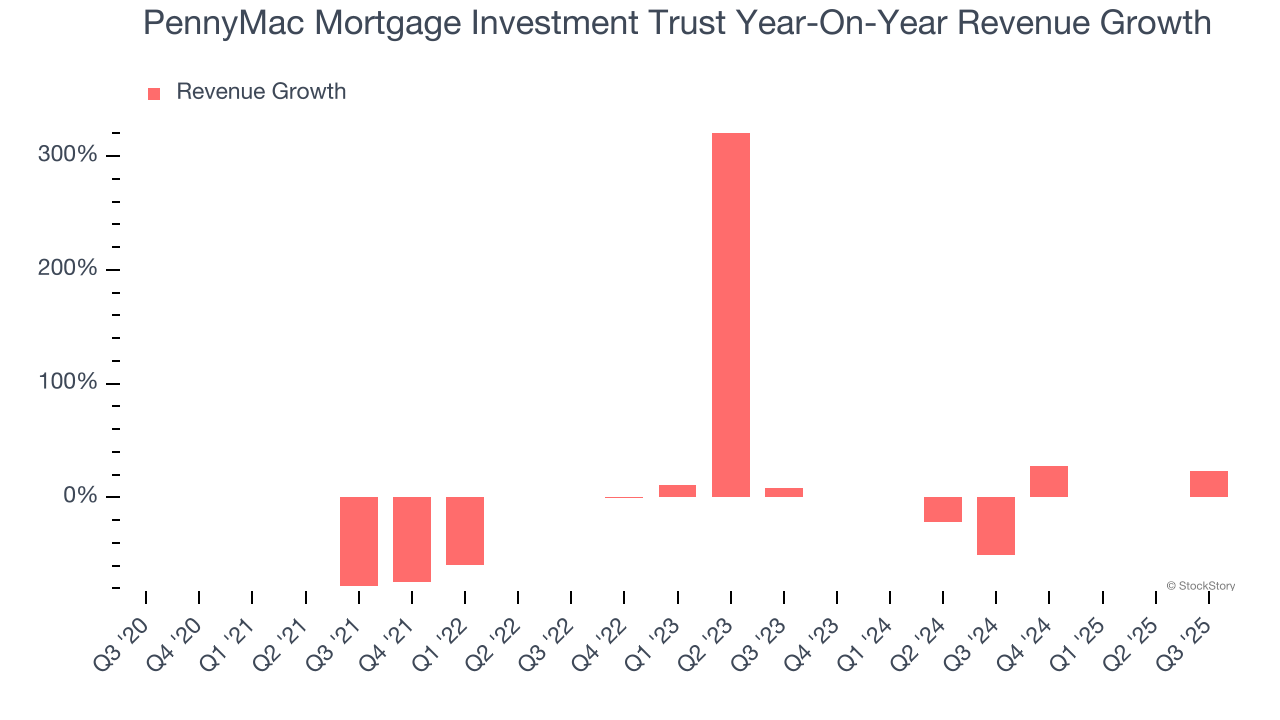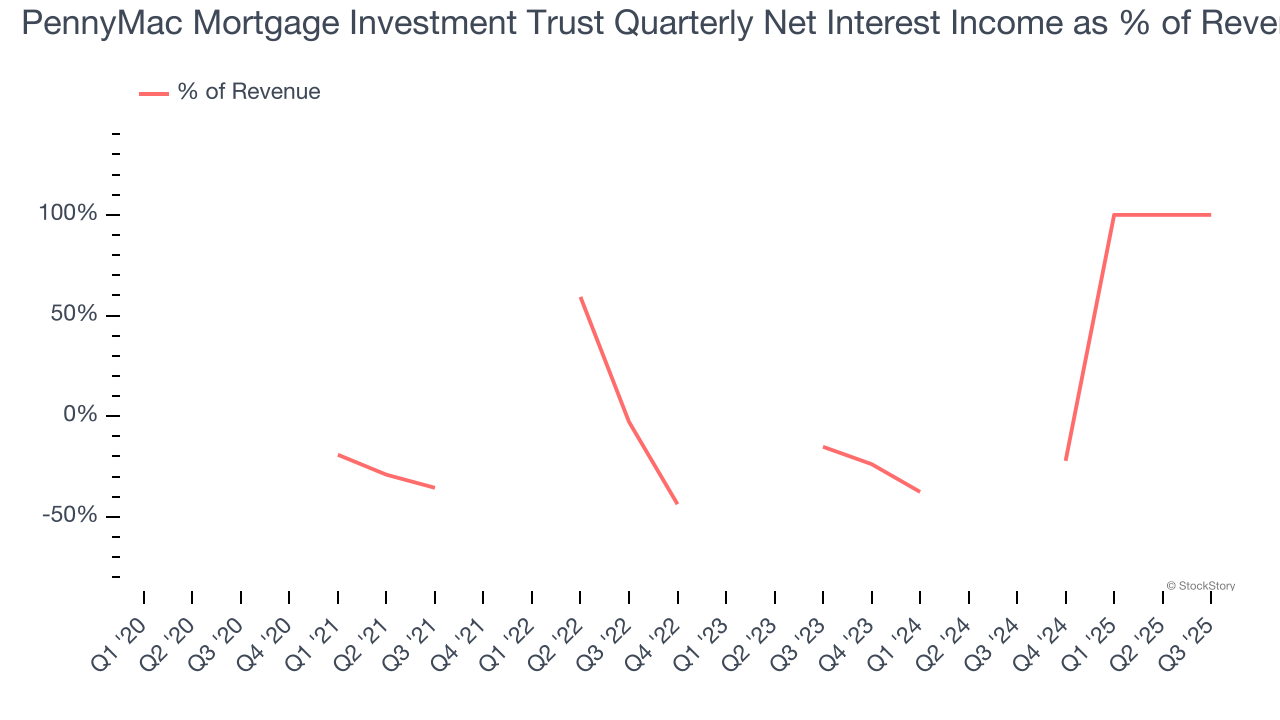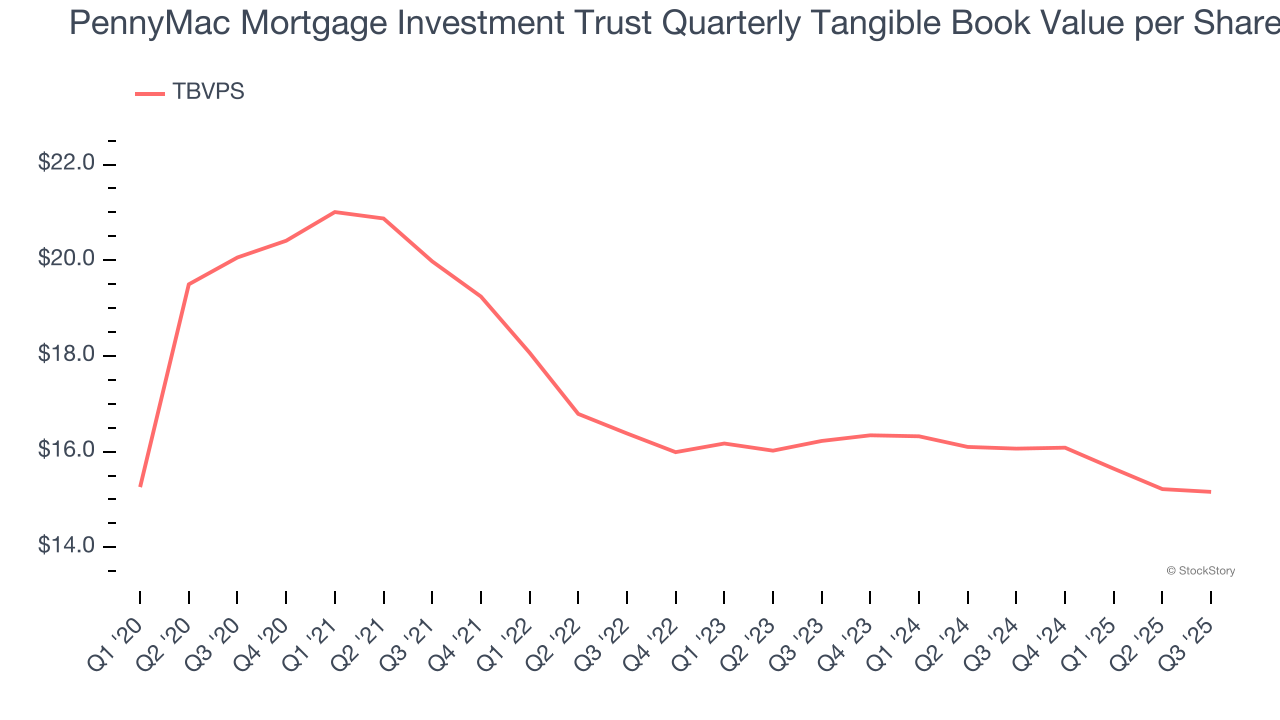
Mortgage REIT PennyMac Mortgage Investment Trust (NYSE:PMT) announced better-than-expected revenue in Q3 CY2025, with sales up 22.7% year on year to $99.23 million. Its GAAP profit of $0.55 per share was 48.7% above analysts’ consensus estimates.
Is now the time to buy PennyMac Mortgage Investment Trust? Find out by accessing our full research report, it’s free for active Edge members.
PennyMac Mortgage Investment Trust (PMT) Q3 CY2025 Highlights:
- Net Interest Income: $99.23 million vs analyst estimates of -$8.13 million (1,320% beat)
- Net Interest Margin: 4.9%
- Revenue: $99.23 million vs analyst estimates of $97.15 million (22.7% year-on-year growth, 2.1% beat)
- EPS (GAAP): $0.55 vs analyst estimates of $0.37 (48.7% beat)
- Tangible Book Value per Share: $15.16 vs analyst estimates of $15.55 (5.6% year-on-year decline, 2.5% miss)
- Market Capitalization: $1.03 billion
"In the third quarter PMT produced outstanding results and growth in book value per share with a 14 percent annualized return on common equity," said Chairman and CEO David Spector.
Company Overview
Operating as a real estate investment trust since 2009 to maintain tax advantages, PennyMac Mortgage Investment Trust (NYSE:PMT) is a specialty finance company that invests in mortgage-related assets and operates a correspondent lending business.
Sales Growth
Two primary revenue streams drive bank earnings. While net interest income, which is earned by charging higher rates on loans than paid on deposits, forms the foundation, fee-based services across banking, credit, wealth management, and trading operations provide additional income. PennyMac Mortgage Investment Trust struggled to consistently generate demand over the last five years as its revenue dropped at a 21.6% annual rate. This wasn’t a great result and suggests it’s a lower quality business.
 Note: Quarters not shown were determined to be outliers, impacted by outsized investment gains/losses that are not indicative of the recurring fundamentals of the business.
Note: Quarters not shown were determined to be outliers, impacted by outsized investment gains/losses that are not indicative of the recurring fundamentals of the business.Long-term growth is the most important, but within financials, a half-decade historical view may miss recent interest rate changes and market returns. PennyMac Mortgage Investment Trust’s annualized revenue declines of 9.6% over the last two years suggest its demand continued shrinking.  Note: Quarters not shown were determined to be outliers, impacted by outsized investment gains/losses that are not indicative of the recurring fundamentals of the business.
Note: Quarters not shown were determined to be outliers, impacted by outsized investment gains/losses that are not indicative of the recurring fundamentals of the business.
This quarter, PennyMac Mortgage Investment Trust reported robust year-on-year revenue growth of 22.7%, and its $99.23 million of revenue topped Wall Street estimates by 2.1%.
Net interest income made up -1.2% of the company’s total revenue during the last five years, meaning PennyMac Mortgage Investment Trust is well diversified and has a variety of income streams driving its overall growth. Nevertheless, net interest income is critical to analyze for banks because they’re considered a higher-quality, more recurring revenue source by investors.
 Note: Quarters not shown were determined to be outliers, impacted by outsized investment gains/losses that are not indicative of the recurring fundamentals of the business.
Note: Quarters not shown were determined to be outliers, impacted by outsized investment gains/losses that are not indicative of the recurring fundamentals of the business.Unless you’ve been living under a rock, it should be obvious by now that generative AI is going to have a huge impact on how large corporations do business. While Nvidia and AMD are trading close to all-time highs, we prefer a lesser-known (but still profitable) stock benefiting from the rise of AI. Click here to access our free report one of our favorites growth stories.
Tangible Book Value Per Share (TBVPS)
Banks are balance sheet-driven businesses because they generate earnings primarily through borrowing and lending. They’re also valued based on their balance sheet strength and ability to compound book value (another name for shareholders’ equity) over time.
This is why we consider tangible book value per share (TBVPS) the most important metric to track for banks. TBVPS represents the real, liquid net worth per share of a bank, excluding intangible assets that have debatable value upon liquidation. On the other hand, EPS is often distorted by mergers and flexible loan loss accounting. TBVPS provides clearer performance insights.
PennyMac Mortgage Investment Trust’s TBVPS declined at a 5.4% annual clip over the last five years. On a two-year basis, TBVPS fell at a slower pace, dropping by 3.3% annually from $16.22 to $15.16 per share.

Over the next 12 months, Consensus estimates call for PennyMac Mortgage Investment Trust’s TBVPS to shrink by 1.4% to $14.95, a sour projection.
Key Takeaways from PennyMac Mortgage Investment Trust’s Q3 Results
It was good to see PennyMac Mortgage Investment Trust beat analysts’ EPS expectations this quarter. We were also excited its net interest income outperformed Wall Street’s estimates by a wide margin. On the other hand, its tangible book value per share missed. Zooming out, we think this was a good print with some key areas of upside. The stock traded up 3.9% to $12.15 immediately following the results.
PennyMac Mortgage Investment Trust put up rock-solid earnings, but one quarter doesn’t necessarily make the stock a buy. Let’s see if this is a good investment. What happened in the latest quarter matters, but not as much as longer-term business quality and valuation, when deciding whether to invest in this stock. We cover that in our actionable full research report which you can read here, it’s free for active Edge members.
